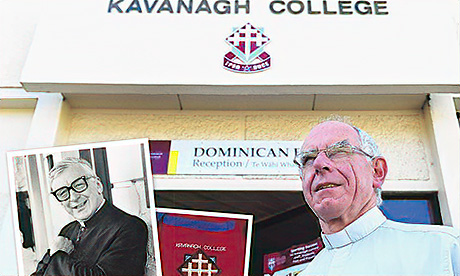Survivor trauma, systemic failures and a failure to act on a complaint of sexual abuse are the reasons Dunedin bishop, Michael Dooley is changing Kavanagh College’s name to Trinity College.
The change takes place on January 1, 2023.
The move by Dooley comes after a report shows former Dunedin bishop, John Kavanagh, did not act on a complaint of sexual abuse.
Dooley says systemic failures at the time let survivors down badly and it is wrong to have a school associated with Kavanagh’s name.
“A number of survivors of abuse in the Dunedin diocese have asked me to change the name of the college,” says Dooley.
“Having the college named after the bishop of that time represents for a number of people the systemic failures of that time and contributes to their trauma.
“I would hope that the renaming of the college will contribute to some healing and reaffirm our desire as a church to listen to victims of abuse and work hard to provide a safe environment for those in our care,” Dooley says.
Renaming the college is the result of an investigation after a number of Dunedin survivors complained that Kavanagh failed to act on claims of sexual abuse by priests.
The result of the investigation shows that seven priests, two brothers and one lay teacher sexually abused children and, in one case, an adult during Bishop Kavanagh’s time as Bishop of Dunedin.
In line with Pope Francis’ 2019 decree, “Vos estis lux mundi” the Metropolitan Archbishop of New Zealand, Cardinal John Dew, requested the inquiry.
In a statement, Dew reported that the investigation showed Kavanagh failed to act on one complaint.
Kavanagh was Bishop of Dunedin for 28 years; from 1957 to 1985.
Dew said the investigation found that Kavanagh knew of complaints relating to two priests: Fathers Freek Schokker in about 1963 and Magnus Murray in about 1972.
He said the investigation also showed Kavanagh did not know of the other cases because complaints were not made until some years after Kavanagh died.
“In the case of Murray, the Complaints Assessment Committee found that Murray admitted the abuse to Bishop Kavanagh and was sent to Australia for treatment,” said Dew.
“Because of that admission, and by sending Murray for treatment, Bishop Kavanagh did what he was required to under the Church canon law at the time.
After returning from treatment in Australia Magnus Murray did not return to Dunedin but became a priest in the Auckland Diocese.
In 2003 he was jailed for five years after admitting 10 offences against four Dunedin boys from 1958 to 1972.
Murray was removed from the priesthood in 2019.
“In the case of Father Schokker, Bishop Kavanagh should have investigated the complaint, but failed to do so,” Cardinal Dew added.
Freek Schokker was a priest from the Netherlands working in the diocese at the time of the complaint. He was accused of abusing two young people. He left New Zealand at some stage after the complaint and was told not to come back. He died in the Netherlands in 1993, at age 81.
“There has been considerable public interest in this inquiry,” said Cardinal Dew.
“Survivors of abuse committed in the Dunedin diocese have called for Kavanagh College in Dunedin to be renamed, based on their belief that Bishop Kavanagh did not act properly on complaints of abuse.
“The outcome of the inquiry is that Bishop Kavanagh failed to act as required at the time on one of the two complaints he knew of. It is now for Bishop Dooley to decide the future of the name of the college.
“I accept that some survivors may not be happy with the decision that Bishop Kavanagh acted properly in respect to Magnus Murray. But that was in the context of canon law of the time.
“We take immediate action on complaints of abuse today. We are committed to a safe environment for all within the Church community,” said Dew.
The inquiry was conducted by the Church’s complaints body which engaged senior Christchurch investigator Micky Earl of the firm Corporate Risks.
Earlier Male Survivors Otago spokesman Michael Chamberlain said he was quietly hopeful the name would change but was unhappy the investigation was to be conducted by the Church’s National Office of Professional Standards.
“It’s coming out, and it will come out from others, how much blood Kavanagh’s got on his hands,” Chamberlain told the Otago Daily Times in 2020.
Sources
